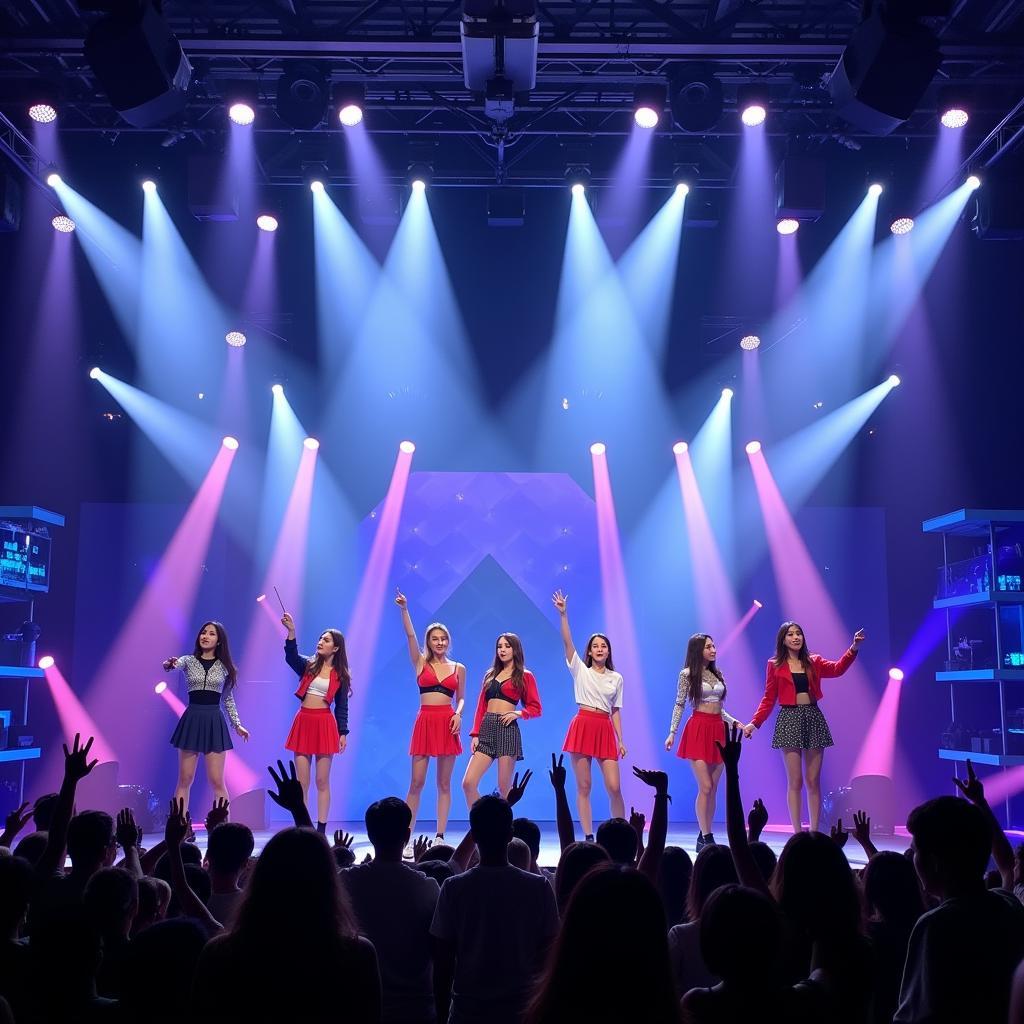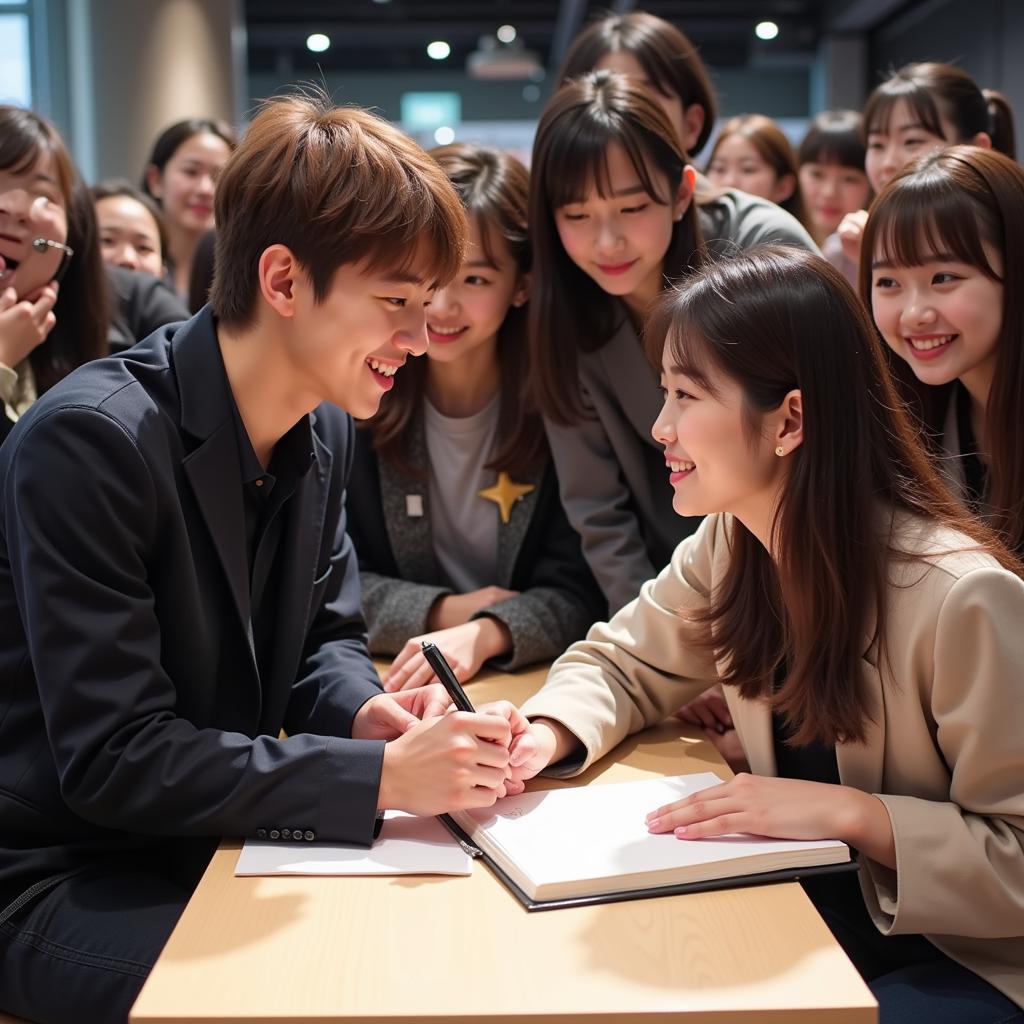Want to gush about your favorite Korean idol in English but don’t know where to start? You’re not alone! Many K-pop fans find themselves struggling to express their admiration in a second language. This article will equip you with the vocabulary, phrases, and cultural understanding you need to confidently discuss your bias in English.
Describing Your Idol’s Talents
Expressing what makes your idol special is key to any fan conversation. Is your bias a powerful vocalist? A mesmerizing dancer? A charismatic rapper? Learning the right vocabulary can help you articulate their talents effectively. For example, you can say:
- “His vocals are incredibly powerful and emotive.”
- “Her dance moves are sharp and precise.”
- “Their stage presence is captivating.”
- “They have a unique rapping style that sets them apart.”
You can also describe their specific skills, like high notes, powerful rapping, or complex choreography. Don’t be afraid to use descriptive language!
Discussing Their Music and Performances
Talking about your favorite songs, albums, and performances is a great way to connect with other fans. Use phrases like:
- “Their latest comeback is amazing!”
- “The choreography for that song is so intricate.”
- “The music video is visually stunning.”
- “I love the message behind their lyrics.”
 Kpop Group Performing Live
Kpop Group Performing Live
Sharing specific details about what you enjoy, like the melody, the concept, or the styling, can spark engaging conversations.
Expressing Your Admiration
Beyond technical skills, you might want to express your personal connection with your idol. This is where understanding nuances in English expressions comes in handy. You can say things like:
- “I really admire their dedication and hard work.”
- “They inspire me to pursue my dreams.”
- “I love their personality and how they interact with fans.”
- “They’re a great role model.”
 Kpop Idol Meeting Fans
Kpop Idol Meeting Fans
Be mindful of the cultural context. While using words like “love” is common among fans, it’s generally understood within the context of fandom.
Navigating Cultural Differences
Understanding the cultural context surrounding K-pop is essential when discussing it in English. Be aware that some terms and concepts may not translate directly. For example, explaining the concept of “bias” or “comeback” might be necessary for those unfamiliar with K-pop terminology.
Explaining “Bias” and Other K-pop Terms
Here are some explanations you can use:
- Bias: “My bias is my favorite member of the group.”
- Comeback: “A comeback is when a K-pop group releases new music and promotes it.”
- Stan: “To stan a group means to be a dedicated fan.”
Conclusion
Talking about your Korean idol in English doesn’t have to be intimidating. With a little practice and the right vocabulary, you can confidently express your admiration and connect with other fans worldwide. Remember to be clear, descriptive, and mindful of cultural nuances. Now go forth and share your love for K-pop!
FAQ
- What are some other ways to describe an idol’s singing voice? (Mellifluous, resonant, soothing, husky)
- How can I talk about an idol’s fashion sense? (Stylish, trendy, unique, elegant)
- What are some good adjectives to describe a K-pop performance? (Energetic, captivating, dynamic, powerful)
- How do I explain the concept of a “fanchant”? (It’s a synchronized cheer that fans do during performances.)
- What are some other common K-pop terms I should know? (Aegyo, maknae, sunbae, hoobae)
- How can I find more resources to improve my English K-pop vocabulary? (Online forums, K-pop news sites, language exchange apps)
- What if I make a mistake while speaking English about K-pop? (Don’t worry! Everyone makes mistakes. Just keep practicing.)
More Helpful Resources
- Check out our article on “Understanding Korean Honorifics”
- Learn more about “K-pop Fandom Culture” on our blog.
Need More Help?
When you need support, please contact Phone Number: 0915063086, Email: [email protected] Or visit us at: LK 364 DV 08, Mau Luong Urban Area, Ha Dong, Hanoi 12121, Vietnam. We have a 24/7 customer support team.